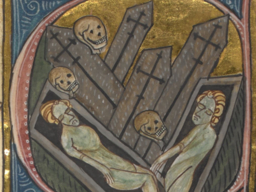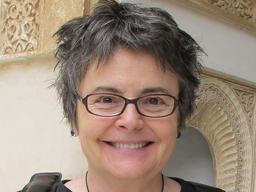Exploring Islamic Manuscripts with the Walters Art Museum
Join curator Ashley Dimmig for a presentation and Q and A
Location
Online
Exploring Islamic Manuscripts with the Walters Art Museum – Online Event
Date & Time
November 18, 2020, 4:00 pm – 5:00 pm
Description
Mini-MEMS Lunch and Learn
Musical Instruments of the Renaissance on Zoom
Location
Online
Mini-MEMS Lunch and Learn – Online Event
Date & Time
October 28, 2020, 12:15 pm – 12:45 pm
Description
THE ENGLISH JOAN OF ARC: Saint, Witch, Man, Maid, or Whore
MEMS Fall Colloquium Lecture, Gail Orgelfinger
Location
Library and Gallery, Albin O. Kuhn
Date & Time
October 29, 2019, 4:00 pm – 5:30 pm
Description
Because the English were ultimately responsible for executing Joan of Arc, the usual view of their changing judgments of her is a progressive one—from witch to heroine to saint. However, their opinions prove to be much more varied and nuanced, encompassing praise, blame, and uneasiness all within 200 years of her death. This talk discusses some of these complex reactions from English historians, playwrights, and biographers through the Early Modern era.
Gail Orgelfinger, Senior Lecturer of English at UMBC, Emerita, is the author of Joan of Arc in the English Imagination, 1429–1829 (Penn State University Press, 2019).

A NEW STORY OF THE BLACK DEATH
How Genetics Is Transforming Our Narratives Of The Plague
Location
Library and Gallery, Albin O. Kuhn
Date & Time
March 12, 2019, 4:00 pm – 6:00 pm
Description
Monica Green, Professor of History at Arizona State University, specializes in medieval European medical history and the global history of infectious diseases. In her talk she will show how our understanding of the Black Death, the plague pandemic that ravaged Europe, the Middle East, and north Africa between 1346 and 1353, has been transformed in the last decades because of new developments in genetics. Historians and archaeologists are now learning to incorporate the findings from genetics into new narratives, ones that show that this largest of pandemics was even larger, and more widespread, than we ever imagined before. Our story must now include not only the Mediterranean and Europe, but also China and perhaps even much of sub-Saharan Africa.

Visualizing Deafness
A Prehistory of Deaf Culture
Location
Library and Gallery, Albin O. Kuhn
Date & Time
October 18, 2018, 4:00 pm – 6:00 pm
Description
The Belitung Shipwreck
Precious Metal Cargo and Global Trade in Medieval Asia
Location
Earl and Darielle Linehan Concert Hall
Date & Time
March 28, 2018, 5:00 pm – 6:30 pm
Description
John Guy is the Florence and Herbert Irving Curator of the Arts of South and Southeast Asia at The Metropolitan Museum of Art, New York, and an elected Fellow of the Society of Antiquaries, London, and of the American Academy of Arts & Sciences. He was formerly Senior Curator of South Asia at the Victoria and Albert Museum, London, has served as an advisor to UNESCO on historical sites in Southeast Asia, and worked on a number of maritime excavations in Southeast Asia, most recently a circa 800 CE Arab dhow in the Gulf of Thailand. He has curated numerous international exhibitions and contributed to many publications, including journals, edited volumes and exhibition catalogues. Major books include Lost Kingdoms. Hindu-Buddhist Sculpture of Early Southeast Asia (2014), Interwoven Globe. The Worldwide Textile Trade, 1500-1800 (co-author, 2013), Wonder of the Age: Master Painters of India (co-author, 2011), Shipwrecked. Tang Treasures and Monsoon Winds (co-editor 2010), Indian Temple Sculpture (2007, repr. 2017), Woven Cargoes. Indian Textiles in the East (1998; repr. 2009), Vietnamese Ceramics: A Separate Tradition (Chicago 1997), Indian Art and Connoisseurship (1995), and Ceramic Traditions of Southeast Asia (1989).

Harmonious Monk
Martin Luther and His Reformation through Music
Location
Performing Arts & Humanities Building : Linehan Concert Hall
Date & Time
October 4, 2017, 7:00 pm – 9:00 pm
Description
In commemoration of the 500th anniversary of the Reformation (October 1517-October 2017), Dr.
Christopher Boyd Brown and UMBC’s Camerata and Collegium Musicum will present
an interdisciplinary concert-lecture on Martin Luther’s use of music and the
community practice of hymn-singing in the Protestant Reformation. Brown will
discuss how Lutheran hymns, sung in the streets and homes as well as in
community spaces, were central to the success of the Reformation. UMBC students
will provide live musical examples of plainchant, Reformation hymns, and
multi-part choral works by Walter and Bach.
Bio: Christopher Boyd Brown is Associate Professor of Church History, School of Theology, Boston University. A recognized scholar of Martin Luther and Reformation music, he has published Singing the Gospel: Lutheran Hymns and the Success of the Reformation (Harvard University Press, 2005), and several studies on the role of midwives in early modern Lutheranism. His translations of Luther and early modern Lutheran theological texts can be found at http://www.projectwittenberg.org/etext/luther/.

ISIS and Cultural Cleansing
Saving the Ancient and Medieval Treasures of Syria and Iraq
Location
Library and Gallery, Albin O. Kuhn
Date & Time
March 7, 2017, 4:00 pm – 5:30 pm
Description
Professor Danti is the Academic Director of ASOR Cultural Heritage Initiatives, an international, collaborative effort to respond to the destruction of cultural heritage in Syria and northern Iraq. ASOR has assembled a team of scholars with professional connections to leading academic and cultural institutions in Syria, Iraq, the United States, Canada, England, France, Germany, Lebanon, and Jordan. Groups of concerned citizens in Syria and Iraq have been taking action, and ASOR formed alliances and partnerships with these groups.

Location
Off Campus
Date & Time
December 9, 2016, 7:30 pm – 9:00 pm
Description

Webb Lecture: Wretched Girls and Wretched Boys
The Medieval Origins of the "European Marriage Pattern"
Location
Library and Gallery, Albin O. Kuhn
Date & Time
November 10, 2016, 4:00 pm – 5:30 pm
Description

- Go to page 4
- Go to page 3
- Go to page 2
- Go to page 1